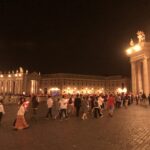Pavevalget 8. mars
 March 10, 2013
March 10, 2013  Internasjonalt, Nyheter
Internasjonalt, Nyheter  Torstein Seim
Torstein Seim  no responses
no responses
 Tagged with:
Tagged with:
Papal conclave: fault lines emerge as cardinals gather to vote
A colourful cast of 115 cardinals are gathering to select a new pope from one of their number to lead 1.2bn Catholics
(From The Guardian)
There are diplomats, academics, intellectuals and theologians. There are hardliners, conservatives, ultra-conservatives, moderates, mavericks and many who simply defy categorisation. When it comes to the conclave of 115 cardinals who will choose the next pope in the coming days, the phrase broad church is entirely appropriate.
Take Cardinal Manuel Monteiro de Castro of Portugal and Cardinal Juan Sandoval Iñiguez of Mexico. In 2004, while papal envoy to Spain, Monteiro de Castro appeared to hint that the church should acknowledge homosexual partnerships as well as heterosexual ones. Although most countries defined marriage as the union of one man and one woman, he said: “There are other forms of cohabitation and it is good that they be recognised.”
Sandoval has taken the other side. Three years ago he described same-sex unions as an “aberration” and was equally blunt on the subject of gay people adopting children, asking: “Would you want to be adopted by a pair of faggots or lesbians?” His other betes noires include at least one other Christian denomination, “you’ve got to be shameless to be a Protestant”, and women who he believes fail to dress and behave correctly: “Women shouldn’t go around being so provocative – that’s why so many get raped.”
These are not the only fault lines. While cardinals such as Ennio Antonelli of Italy and Jean-Louis Tauran of France bitterly opposed the US-led invasion of Iraq, others are more hawkish on matters of security. After the capture of the head of the Shining Path terrorist group in 1992 – which signalled the end of the bloody insurgency that claimed 70,000 lives in his native Peru – Cardinal Juan Luis Cipriani called for the earthly ultimate punishment. “We cannot allow the fears, worries and cowardice of a few people in the country to stop us approving the death penalty,” said Cipriani, a member of Opus Dei and champion basketball player in his youth.
Some cardinals, however, share remarkably similar views. Many African cardinals, for example, are sceptical about using condoms to halt the spread of HIV/Aids. Wilfrid Napier of South Africa expressed doubts about the efficacy of condoms; John Njue of Kenya has blamed them for the spread of disease, while Cardinal Anthony Okogie of Nigeria has gone so far as to say: “The condom is widely known not to be a safe protector against HIV/Aids.”
Cardinal Peter Turkson, the archbishop emeritus of Cape Coast in Ghana and the man judged Africa’s best hope for pope, has stressed the importance of common values, recently telling a TV interviewer that that Africa had largely escaped the sexual abuse scandals that wrought so much damage on the western church thanks to its strong taboos against homosexuality.
“African traditional systems kind of protect or have protected its population against this tendency,” he told CNN. “Because in several communities, in several cultures in Africa, homosexuality, or for that matter, any affair between two sexes of the same kind are not countenanced in our society … It’s helped to keep this out.”
Taboo or no taboo, other cardinals have found themselves bound together rather more ineluctably. Although Cardinal Keith O’Brien opted to absent himself from the conclave after he resigned as archbishop of St Andrews and Edinburgh over allegations that he had behaved “inappropriately” towards four priests, some scandal-hit cardinals have refused to recuse themselves.
Cardinal Sean Brady, archbishop of Armagh, Cardinal Timothy Dolan, archbishop of New York, Cardinal Roger Mahony, archbishop emeritus of Los Angeles, and Cardinal Justin Rigali, former archbishop of Philadelphia, have all faced – or are facing – questions about what they knew about the abuse of children by priests. But all have decided to go to Rome for the conclave.
Then there are those who find fame for other reasons: Cardinal Jorge Mario Bergoglio, the Jesuit intellectual and archbishop of Buenos Aires who travels around town by bus and told his compatriots not to waste their money on plane tickets to Rome to see him become a cardinal but to give it instead to the poor; Cardinal Dominik Duka of the Czech Republic, who practised and deepened his faith despite enduring years of state repression; Cardinal Fernando Filoni, who refused to leave his diplomatic post in Iraq in the violence that followed the US invasion, saying “If the pastor flees in moments of difficulty, the sheep are also lost”; Cardinal Luis Antonio Tagle, the charismatic, 55-year-old archbishop of Manila, whose scholarship on the second Vatican council and passionate defense of the sanctity of life have won him popularity on both sides of the political divide; and Cardinal Óscar Rodríguez Maradiaga of Honduras, who has proved an ardent defender of human rights and a fierce critic of capitalism and the drug trade. The archbishop of Tegucigalpa would be a perfect Latin American candidate to succeed Benedict were it not for his leftist leanings and his intemperate comparison, in 2002, of the US media’s coverage of the church sexual abuse scandals with the persecution of Christians by Nero, Hitler and Stalin.
The geographical divide is instructive: 60 of the cardinals are European, 19 Latin American, 14 North American, 11 African, 10 Asian and one Australian.
The 28 Italian cardinal electors, who comprise nearly a quarter of the total number of pope-makers, do not want for colourful characters among their ranks either, be they Angelo Amato, who takes a markedly revisionist approach to the church’s treatment of Galileo, Angelo Bagnasco, who has publicly denounced the “intrinsically wretched and empty” behaviour of some Italian politicians – although he did not mention Silvio Berlusconi by name – or Gianfranco Ravasi, a Dante enthusiast who believes that Darwin’s theory of evolution is compatible with the church’s teachings on creation.
Then there is the Vatican’s finance minister, Domenico Calcagno, who is known as Rambo in certain sections of the Italian press because of his extensive collection of firearms, which includes a Smith & Wesson magnum, a Turkish pump-action Hatsan shotgun and a Remington. It is unclear whether he possesses a Beretta to go with his biretta.
Even they, however, struggle to compete with Cardinal Tarcisio Bertone, who has a knack for attracting publicity – and not all of it positive. Despite winning fans by donning a sheepskin coat to provide live commentary for a match between Sampdoria and Juventus while archbishop of Genoa in 2004, and memorably dismissing The Da Vinci Code as “a potpourri of lies; a phantasmagorical cocktail of inventions”, his more recent headlines have been less favourable. In 2010, he provoked an international outcry after suggesting that the blame for the sexual abuse crisis lay with the nature of homosexuality rather than the pressures of priestly celibacy.
“Many psychologists and psychiatrists have shown that there is no link between celibacy and paedophilia but many others have shown, I have recently been told, that there is a relationship between homosexuality and paedophilia,” he said.
But neither such pronouncements nor the pressures of the Vatileaks affair – which was seen by many as a direct attempt to discredit him – appear to have done serious damage to Bertone’s reputation. Benedict XVI’s secretary of state, who is now 78, remains a popular candidate to succeed his former boss.
With the clamour for the new leader of the world’s 1.2 billion Roman Catholics to be a strong, untainted reformer growing ever louder and more urgent – and so many candidates to choose from – the cardinals face an unenviable task as they enter the conclave to decide who he will be.
The only thing you can be sure of is that all 115 of the men meeting in the Sistine Chapel will have wondered what they would say if they were to be elected and suddenly found themselves asked for the papal name they had chosen. “I think,” said one conclave veteran, “that all the cardinals have a name up their sleeve.”



